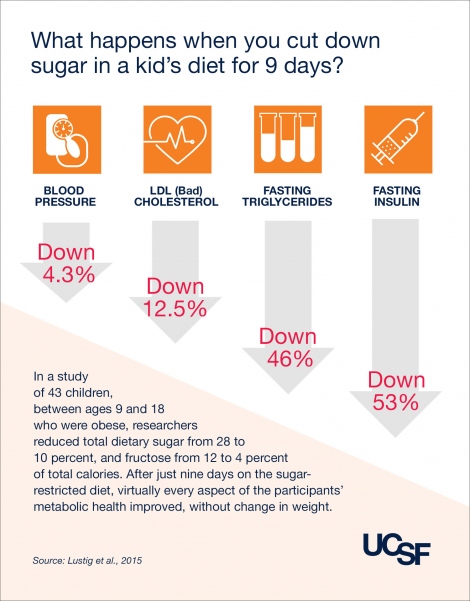Losing The (Refined) Sugar Bowl
"This study definitively shows that sugar is metabolically harmful not because of its calories or its effects on weight; rather sugar is metabolically harmful because it's sugar."
"The study indicates that sugar contributes to metabolic syndrome, and is the strongest evidence to date that the negative effects of sugar are not because of calories or obesity."
"All of the surrogate measures of metabolic health got better, just by substituting starch for sugar in their processed food – all without changing calories or weight or exercise. This study demonstrates that ‘a calorie is not a calorie.’ Where those calories come from determines where in the body they go. Sugar calories are the worst, because they turn to fat in the liver, driving insulin resistance, and driving risk for diabetes, heart, and liver disease. This has enormous implications for the food industry, chronic disease, and health care costs."
Robert Lustig, pediatric endocrinologist, University of California, San Francisco
"These findings support the idea that it is essential for parents to evaluate sugar intake and to be mindful of the health effects of what their children are consuming."
"When we took the sugar out, the kids started responding to their satiety fullness cues. They told us it felt like so much more food, even though they were consuming the same number of calories as before, just with significantly less sugar. Some said we were overwhelming them with food."
“I have never seen results as striking or significant in our human studies; after only nine days of fructose restriction, the results are dramatic and consistent from subject to subject."
Dr. Jean-March Schwarz, Touro University California, College of Osteopathic Medicine

The issue was how to improve chronic metabolic diseases in children; blood pressure and high cholesterol levels, as an example. Researchers in California assembled a fairly small study group comprised of 43 children between the ages of nine and 18 to proceed with their study, which was later published in the journal Obesity. The study was comprised of a nine-day period where the children had their meals, snacks and beverages as usual, but with a reduced sugar component.
Fructose, a 'natural' form of sugar was not eliminated, just added, refined sugar, since the children were permitted to retain fresh fruit in their diets which were comprised of the same fat, protein and carbohydrates that their ordinary diet consisted of before the study was undertaken. The only difference was that added sugar was eliminated. Though sugar is a carbohydrate, it was replaced with other types of carbohydrates, such as cereal and bagels. And nor were hot dogs, pizza and chips forbidden in this protocol.
The elimination of added sugar, however, was what made the difference, even though it is known that rice, cereal, pasta and bagels have a high glycemie rate. Fasting blood levels were recorded to obtain a record of blood pressure, glucose tolerance and any other indices of metabolic absorption before each meal. If any children lost weight as a result of fewer calories from added sugar, low-sugar options were offered to aid in weight maintenance. But dietary sugar had been minimized from 28 percent of their meals to ten percent, while fructose from carbohydrates descended to four percent from twelve.
It took little time for the diet to demonstrate positive health effects. A drop in blood pressure, cholesterol, and improvements in liver function became evident. Insulin levels dropped by a third, while fasting blood glucose levels fell five points. LDL-cholesterol (acknowledged as 'bad' cholesterol) was reduced by 10 points, and liver function tests were seen to improve. The results were clearly dynamic, more than validating the researchers' belief that added sugar was the culprit in many of the symptoms of chronic medical situations evinced in the subjects.
At the same time, this was a small study, and additional studies with a larger body of participant subjects as well as studies conducted with adults need to be undertaken. Yet this one small study following on an educated hypothesis, with its clear results, certainly indicates the wisdom of minimizing added sugar in our diets to become accustomed to doing without a substance that appears to present as a danger to our health.

Labels: Bioscience, Diet, Disease, Health, Research

0 Comments:
Post a Comment
<< Home